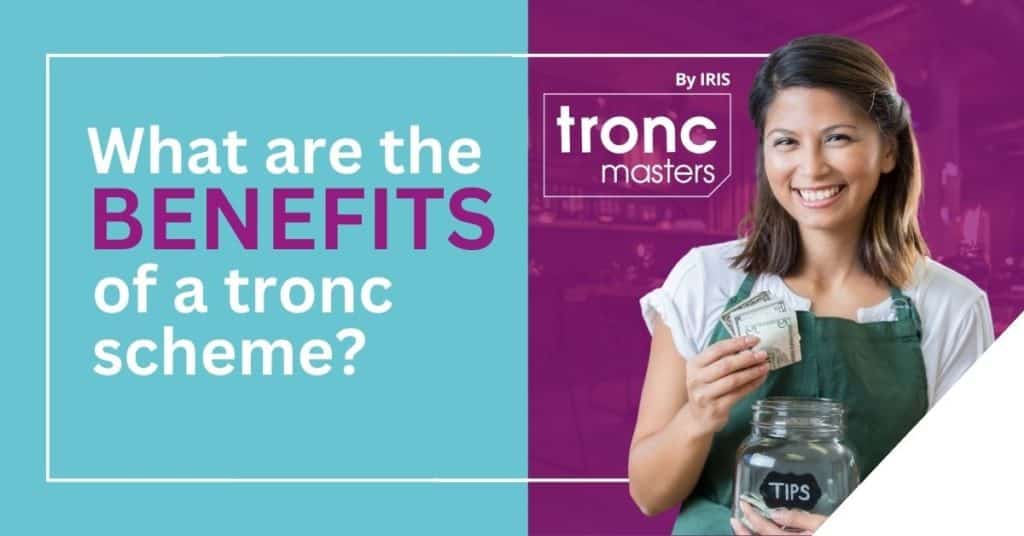
UPDATED JANUARY 2024
Tronc schemes have been around in the hospitality and leisure industry for a while and are only growing in popularity as cashless payments rise.
However, while many people have heard the term ‘tronc’, a lot aren’t sure exactly what it means or how it works in practice.
Put simply, a tronc is a pay arrangement that allows for the fair distribution of pooled tips and service charges given by customers to employees. It makes the tipping distribution process fair and transparent, saves on unnecessary National Insurance tax for the business and keeps more money in your employees’ pockets – win-win!
In this piece, we’re breaking down everything you need to know about a tronc scheme, from what the term means to the benefits it can bring your business.
Tronc meaning: What does tronc stand for?
A tronc is an arrangement that organises how businesses distribute their customer tips – additional money given by customers – to staff.
The word ‘tronc’ isn’t actually an abbreviation; it’s a term based on a historic French phrase, “tronc des pauvres” – a box used to collect coins for charity. Today, the term is most commonly used across hotels or restaurants in the hospitality and leisure sectors, referring to the fund or pool where tips and service charges are collected before being distributed amongst staff.
Troncs help businesses fairly share tips, gratuities and service charges while ensuring employees’ tips aren’t subject to National Insurance Contributions. So, with a tronc scheme, tips are paid fairly and in full.
How does tronc work?
A tronc system is a separate pay arrangement put in place by the business. When a customer leaves a tip or gratuity, or pays a discretionary service change, that money is collected within the tronc scheme to separate it from the general business charges.
Although they have been around for a while, troncs are becoming much more common in business due to the move away from cash and an increase in customers paying through card or contactless. If a tip is paid with a card, it becomes part of the business bank account and must then be paid to employees through the payroll. This introduces a new challenge – how are these tips paid?
Many businesses think the solution is simple: add the tip to the employee’s pay. However, by combining tips and regular pay, tips attract not only tax but also National Insurance payments for both the employer and the employee, meaning the total tip received is less than what the customer paid.
A tronc scheme solves this problem. With a correctly set up tronc, tips are paid out to employees through the tronc and do not incur National Insurance payments even when paid through the employer’s PAYE.
A tronc scheme has distribution rules; how will you apportion the pooled tips amongst your staff?
How your tronc is structured depends on many variables, and your Troncmaster is responsible for deciding what this structure looks like and how it will be implemented.
A tronc scheme can be as simple or complex as you want, from a simple even share scheme to a very complicated scheme based on a points system.
What are the benefits of a tronc system?
There are multiple benefits to using a tronc scheme for managing and distributing discretionary pooled tips, but the main reason businesses use a tronc scheme is cost savings.
If you are not using a tronc scheme and are distributing tips to your staff via their payroll, you will be attracting both Employers’ National Insurance and Employees’ National Insurance.
At a time of escalating costs for the hospitality sector, can you afford to give 13.8% of the value of pooled tips collected to HMRC when you don’t have to?
Just think about this for a moment: if your business is collecting, say, £20,000 per month in tips every month, you could be paying up to £2,760 a month in Employers’ NI. That’s over £33,000 a year. What could your business do with that kind of money?
And your employees are missing out, too. Without a tronc scheme, they will have NI deductions from their tips, so for every £100 of tips they receive, they could be deducted 10% of this amount.
Further benefits of a tronc scheme include:
Staff recruitment and retention
A tronc scheme isn’t just about saving money. The other key challenge facing the sector at the moment is attracting and retaining staff. By offering a fair and transparent tronc scheme, businesses can attract and retain top talent. Employees are more likely to join and stay with an employer who values and rewards their hard work and maximises the tips they receive.
Our blog ‘Topping up salaries and benefits‘ further explains the positive impact a tronc scheme can have on staff recruitment and retention.
Being an ethical employer
Ensuring all tips and gratuities are distributed fairly and transparently helps hospitality businesses demonstrate their commitment to treating staff with equal respect and fairness.
Tronc schemes also allow businesses to stay compliant with industry legislation and compliance regarding their tip distribution. The new Tip Bill (which comes into lay July 2024) is legislating for the fair allocation of tips, and a tronc scheme is the best way to demonstrate this fairness.
What is included in a tronc scheme?
A tronc scheme can only distribute the proceeds of discretionary tips, gratuities and service charges. This will usually include all tips made on cards and service charges added to the bill as long as the customer is aware they are discretionary and has the option of not tipping.
A tronc also includes cash tips if these tips are pooled rather than kept by the individual.
You can still have direct tipping, where the tip goes directly to the individual, but this can’t be included in a tronc scheme, so it is still subject to tax and NI.
Currently, it is up to the business what proportion of the service charges paid by customers are included in the tronc. The passing of the Employment (Allocation of Tips) Bill, which comes into effect in July 2024, makes it law for tips to be passed on in full to workers without deductions.
A tronc is managed and controlled by a ‘Troncmaster’
Your Troncmaster can be an individual within your business or a third-party Troncmasters service. Whoever you choose must be independent of the company’s decision-making and hiring responsibilities. So, this rules out business owners, directors, senior management, HR and possibly other staff such as Team Leaders if they have a part in hiring.
The wrong choice of Troncmaster could make your tronc scheme non-compliant with HMRC, which could result in investigations and the repayment of NI on tips for the employer and employee. Independent research in 2022 highlighted that over 50% of tronc schemes could be non-compliant due to their choice of Troncmaster, so it is a crucial decision to get right.
Your Troncmaster can also be external to the business, such as our Troncmasters service. Having an independent third-party act as the Troncmaster ensures absolute independence and has broader experience setting up and administering tronc schemes.
Read our blog about how to build a tronc scheme for ideas on how it can be structured.
Find out more
If you would like to further discuss how your business can benefit from a compliant tronc scheme, contact Troncmasters for an informal chat.
